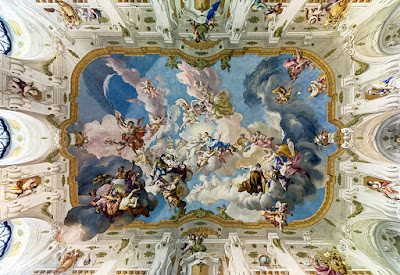There are Similarities between Science and Religion
Science and
religion are often perceived to be opposed to each other. But in many ways they
are not very different. Both have common elements of philosophy, both are
widely followed. More importantly, people have faith in both. Even the
conceptualization of universe in science and religion has very interesting
commonalities. In fact, understanding one may help in appreciating the other.
 |
| The Harmony between Religion and Science: A Ceiling fresco of the Marble Hall at Seitenstetten Abbey (Lower Austria) by Paul Troger (1735) |
In many ways, religion is the science of ancient times, and science, in more ways than one, is the religion of modern times. In a strange, way, they are closer than what some people think, even if the usual perception may be different. Perhaps a factor that binds them close together is that they are both very important conceptual products that have enriched humanity and made us what we are today.
Some Features of
Religion & Science
Religion means
somewhat different things in different civilizations, but almost always it has
certain distinct features - philosophy, faith, social (human) welfare, a
curiosity to know and understand life and this universe, finding the best
course of action and humility about own ignorance and smallness. Most of these
are essential characteristics of science too.
It is easy to agree
that elements of philosophy, welfare, curiosity, and finding the best course of
action are common to both science and religion, but there could be a possible
argument that faith may not belong to this list. If I am asked that question, I
will like to respond by asking another - have you seen an electron? or a
proton? or even a bacteria? You have not, nor will you ever do, yet you believe
that they exist, because somebody whom you believed said so. So, most matters
of science are, for most of us, as much a matter of faith, as are the matters
of religion.
Religion is a Way
of Life
Different
civilizations have different religious concepts. One of the earliest surviving
faiths on this planet is "Sanatan Dharma" or 'eternal duty', more
commonly known as Hinduism. Interestingly, those who believed in it never
called it so. 'Sindhu' in Indian languages means 'river', and as Indian
civilization, like all others, was nurtured around major rivers. The lands adjoining
those rivers came to be called as land of rivers (sindhu), and were referred as
'Hindu' by foreigners from the West. Everything existing in that territory was
called 'Hindu' by them. The faith that is now sometimes called Hinduism
literally means 'eternal duty', and it revolves around the question as to what
should be the duty of every individual in his own life, family, society and
profession. The whole faith is based on solving this riddle, but during the
many thousand years of its existence it has become riddled with many myths,
mystique, legends, poetry, traditions and rituals, all of whom have not only
become an inseparable part of the faith, but sometimes they overshadow the
basic philosophy itself.
Most other
religions are also primarily a result of human quest for understanding itself
and the universe. Between the two, or interspersed with them, lies the concept
of 'almighty god' - the eventual superpower, who is the creator and the
creation of all that exists.
The Almighty God
It is the concept
of this 'almighty god' which is one of the strongest common factor between
religion and science. Ancient religious philosophers in India defined god as
something that has neither a beginning, nor an end, which cannot be created and
which is beyond the understanding of all living beings. They also defined the
changes in the world - the daily happenings of our life - as very trivial, like
a myth. In fact, a particular text, titled "Srimad Bhagwat Gita",
that gave rise to 'Yoga', calls human existence and human experiences
themselves as 'superfluous' ("mithya").
Science also tells
us something very similar. Matter and energy can neither be created, nor
destroyed - only converted from one form to another. The human being is nothing
but a working system of many molecules of mass and some forms of energy, which
once separated will continue to remain, without the existence of our own being
- in that way, our existence is hardly real. it is more like a dream, which
never exists, but for humans, it does, and that is the irony of mankind.
No comments:
Post a Comment